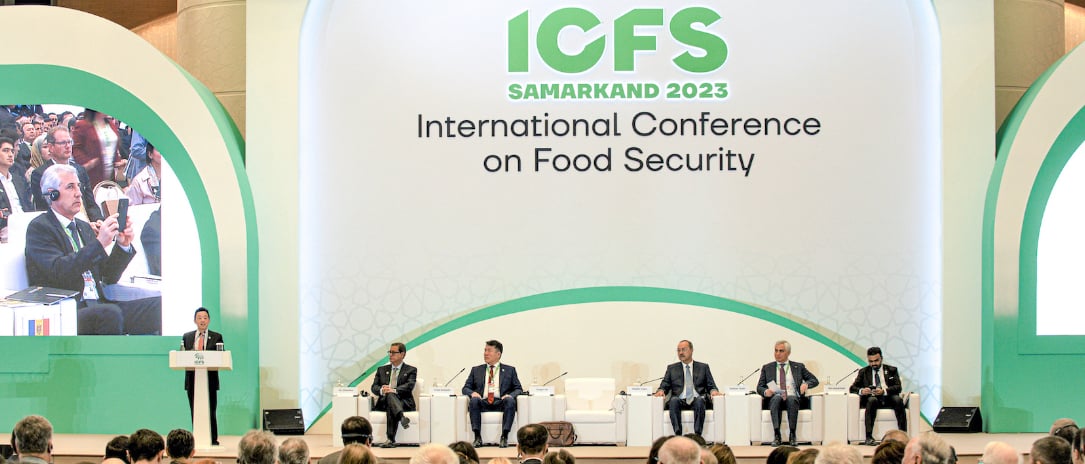November 27, 2025 | 19:09 GMT +7
November 27, 2025 | 19:09 GMT +7
Hotline: 0913.378.918
November 27, 2025 | 19:09 GMT +7
Hotline: 0913.378.918

FAO Director-General Qu Dongyu delivered opening remarks at the International Conference on Food Security in Uzbekistan.
The Director-General of the Food and Agriculture Organization of the United Nations, QU Dongyu, today renewed calls for the transformation of global agrifood systems at an International Conference on Food Security in Uzbekistan.
The conference, held in Samarkand on September 7-8, is organized by the Government of Uzbekistan with the technical support of FAO. It aims to review the current state of food security in the world, deliberate on some key agrifood systems challenges, and identify solutions in the Central Asia region and beyond.
This conference "is an important opportunity to review the state of global food security in the context of agrifood systems transformation, on the path towards achieving the 2030 Agenda and the SDGs (Sustainable Development Goals)," Qu said in his opening remarks to the conference.
The event in Samarkand takes place ahead of the UN's SDG summit, which will see world leader gather in New York to review the state of the Agenda's 17 SDGs. Qu said he expected the consensus and suggestions that will be reached in Samarkand to inform proceedings at the New York summit.
Food security means that all people, at all times, have physical, social and economic access to sufficient, safe and nutritious food that meets their nutritional needs and dietary preferences for an active and healthy life.
According to FAO's 2021 World Food Security and Nutrition report, about 2.3 billion people in the world are currently moderately or highly food insecure, of which 25 percent, or 566 million people, live in Asia.
Food security is currently threatened by food price spikes and excessive volatility, especially of some key food staples, as well as significant levels of food inflation. FAO estimates that 45 countries are currently in need of external food assistance.
Part of the solution, Qu said, is to "improve production and at the same time offer a sustainable supply through international trade and through smooth logistics, food availability, food accessibility, and food affordability."
Meanwhile, El Niño (a climate pattern that describes the unusual warming of surface waters in the central and eastern tropical Pacific Ocean) is adding to some of the key drivers of food insecurity, such as the climate crisis, conflicts and economic slowdowns and downturns, by posing a risk to agricultural production and food security in several regions, particularly in Africa and Central America.
With agriculture responsible for approximately a quarter of greenhouse gas emissions (a figure that is likely to increase to about 50 percent by 2050), and food insecurity traditionally affecting vulnerable communities such as Indigenous Peoples and women the most, the Director-General has repeatedly emphasized the need to transform global agrifood systems.
Such a transformation is necessary to meet the increased demand for food, feed, fiber and fuel, while reducing pressure on natural resources; reduce greenhouse gas emissions and safeguard biodiversity; increase resilience to the impacts of the climate crisis, conflicts and other disruptions to supply chains; ensure decent employment; and ensure access to safe and nutritious food and healthy diets for all.
The costs and the benefits of transforming agrifood systems
FAO estimates that transforming agrifood systems will cost $4 trillion from now to 2030 in low- and middle-income countries. On the other hand, FAO estimates that closing the gender gap in farm productivity and the wage gap in agrifood systems alone would increase global GDP by $1 trillion, thereby reducing global food insecurity by at least 2 percentage points, and the number of food-insecure people by 45 million.
FAO, for its part, is focussing on four key areas: science and innovation, improved data capabilities, finance, and governance, Qu said.
Focus on Asia
Central Asia is exceptionally vulnerable to the impacts of the climate crisis, and landlocked countries such as the host of the conference, Uzbekistan, are among the most water stressed regions of the world.
In this context, Qu highlighted the need to focus on water savings and water efficiency, as well as on technological transfers and investments from Asia, Europe and beyond.
The conference's opening also saw interventions from Uzbekistan's Prime Minister, Abdulla Nigmatovich Aripov.
During the gathering, participants will be updated on the status of implementation of national pathways in line with the outcomes of the 2021 UN Food Systems Summit, with special attention to the situation of food insecurity in Asian countries.
The Samarkand gathering is also expected to discuss the implementation of practical tools within the framework of FAO's Science and Innovation Strategy 2023-2031. These include a permanent platform for the interaction of scientists in the field of agricultural sciences, a unified food safety monitoring system, and evidence-based agricultural production monitoring systems for production planning, policy and development programs.
(FAO.org)

(VAN) A new study reveals how the simultaneous effects of ocean acidification, salinity and loss of oxygen are making the world more fragile.

(VAN) Hopes are growing that the creation of the first 3D turkey gut model could be a turning point in the battle against the virulent blackhead disease.

(VAN) Tyson, America’s biggest meat supplier, plans to shutter one of its largest beef processing plants as the industry continues to struggle with low cattle supplies and political pressure from Washington.

(VAN) New FAO study shows how digital solutions are empowering farmers and fishers to prevent losses and build resilient agrifood systems.

(VAN) Brazil's COP30 presidency pushed through a compromise climate deal on Saturday that would boost finance for poor nations coping with global warming but that omitted any mention of the fossil fuels driving it.

(VAN) Poultry farmers in the UK have been warned that they could face one of the worst winters yet for bird flu.

(VAN) Prices of main-crop paddy have risen sharply, with jasmine rice hitting 16,100 baht per tonne — the highest level in years.